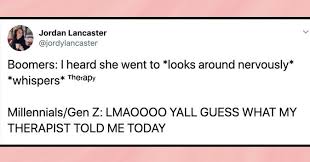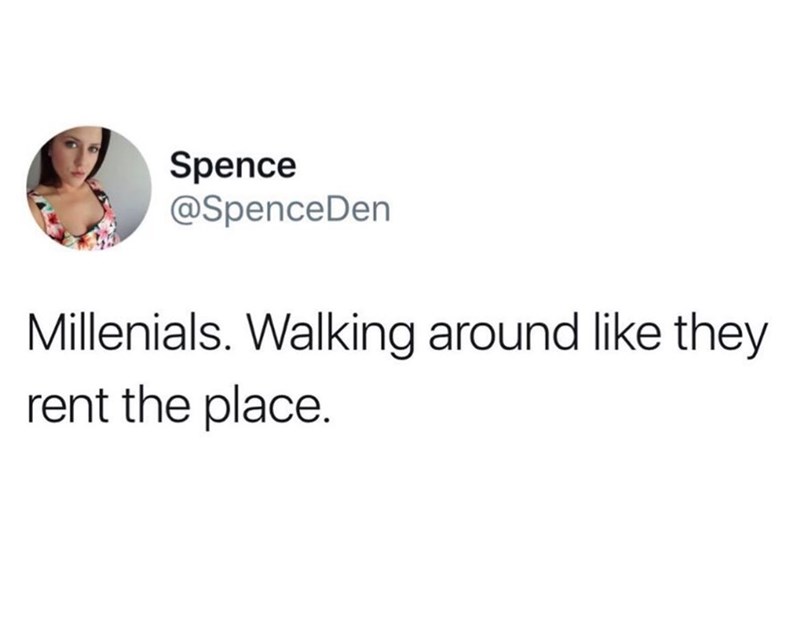Communicating To A Millennial Target Audience

When targeting a millennial, there are a few practices you can implement in your writing and overall communication skills to further your efforts with this cohort. In this blog, learn how to write, how to talk, and how to sound, to better target a member of the Millennial generation.
Tone of Voice in Millennial Copywriting
Write It Like I Talk It
- Whilst Baby boomers tend to prefer a professional, diplomatic and somewhat formal tone of voice. Millennials tend to prefer straight to the point, clever copywriting. Noticed that blogs will now lean towards using “modern terms” and having side conversations within a sentence to add humour, or to simply feel more like a natural conversation? If yes, that’s because that blog was trying to talk with you, not at you. Spectrio stated millennials are “less likely to trust and show loyalty to companies that sound corporate and generic”.
Self-Referential References
Have you ever experienced talking to a millennial and hear/read one of these: “oh yeah a lot of adulting today” or the “struggle is real” you know exactly which self-referential phrases millennials often communicate through. “They’re using (…) slang and a self-referential tone that no one expected.”
References to Memes and Popular Cultural References
eg.: Jimmy John’s sandwich tweet reads: ”You vs the guy she tells u not to worry about:” Just like self-referential phrases that millennials often refer to, this generation frequently communicates through phrases that originated in an online space.
If you’re a baby boomer or you happened to be uncomfortable by the idea that millennials do contribute to the English language with pop culture and online references (with for example with dictionary entries such as selfie and bootylicious), I encourage you to consider a different perspective.
Stop for a second to think about the development of language in general, and how we still have a presence of proverbs and sayings that date all the way back to middle ages (There’s no point crying over spilt milk!). The concept of having a moral concept summarised into a popular expression has always existed across generations and it’s not exclusive to Millenials and the fast development of technology/internet. Ahhh the power of language.
Literary Elements in Millennial Writing
Cliches & Buzzwords
On the flip side, companies that try too hard also have a tough time connecting with this audience. Although there are specific phrases that most millennial would use, that doesn’t mean your business should deliberately use them.
Contrary to what one might think, adding popular buzzwords at the end of a post such as “af, Guuuurl, Bestie, bff, swag, yolo, omg.” isn’t great. In fact, millennials tend to associate this as a failed marketing tactic to identify with them. As millennials being the first generation to grow alongside the fast development of the internet and technology, they can spot phoniness a mile away. They can easily tell when the use of this wording isn’t natural.
Worry not, you can still write a great copywriting without these words. This is a great example of marketing copywriting for millennials by Grubhub:
“we wish everything in life made us as happy as when the delivery guy rings the doorbell” . This works because it’s the use of a meme reference without trying too much. It’s relatable without using any cliche buzzword.
When To Use Millennial Buzzwords and References?
So, how do you know what buzzwords and meme references are okay for your brand to use? As a rule of thumb: “Don’t tweet anything you can’t imagine your most senior employee saying without it being the cringiest thing in the world”. It helps if you have a millennial in your office that can help you with this. (Yet another reason to hire a millennial!)
Besides buzzwords, try to avoid phoney and unwarranted hashtags, Urban Dictionary terms, and anything else that will date your message in the effort to look “with it.” as well.
Splash Writing
This is particularly relevant when they’re communicating their enthusiasm and passion on a certain matter.
This splash writing can be seen in a statement writing, by using caps lock and emojis or dramatic general keywords to defend their point of you. I’m sure you’ve seen tweets “PERIOD!” or something along the lines of “Y’ALL LOOK HOW CUTE THE CAT IS”.


Whilst this looks general and applicable to any generation, baby boomers don’t use this type of writing purposefully, and typically Gen Z expresses emotion through emojis.
Disruptive Traditional Literary Elements
The disruption of traditional literary elements can arguably be a movement in itself started by the millennials. This is a reflection of how millennials are big adopters of authenticity and disruption to traditional norms.
That’s right we’re going there…millennials disrupted traditional office work and introduced technology to the workforce landscape through digital transformation effortlessly, and literary…it shows!
Some examples of literary rebellion against traditional rules of language include writing in lowercase purposefully, different pronunciation of the words and resourcing words with multiple meanings.
We’ve witnessed when it comes to marketing, billboards are written in lowercase, songs title’s styling are written in lowercase and often missing letters eg: “breathin”, and titles so longs that are long sentences.
Words such as “flex” that had one simple, direct connection are no longer the case as it can also mean to show off. These are disruptive of traditional copywriting and even literature.
Case Study: Copywriting for a Millennial
This example, is an illustrative of literary disrupt typically characteristic of a millennial.
“Did your dad ever tell you to stop being so soft but you’re a pancake and you literally don’t know any other way to be?”
- Long Headings.
- Use of Headings as a paragraph.
- CTA’s under a conversational format (non-obvious).
- Use of Irony in headings.
- Using comparative objections to decorate copy instead of using qualitative adjectives. Eg. Did your dad ever tell you to stop being so soft but you’re a pancake and you literally don’t know any other way to be?, instead of ‘Did you dad ever tell you to stop being sloppy but you literally don’t know any way to be?’.
- Use of words of connectors to emphasise and communicate excessiveness such as “literally” and “like”. Eg. Did your dad ever tell you to stop being so soft but you’re a pancake and you literally don’t know any other way to be?, instead of ‘Did you dad ever tell you to stop being so soft but you’re a pancake and you don’t know any other way of being?’
- Use of Irony & Sarcasm
Frequent reinforce of the obvious for a comical effect. - Lists
They appreciate learning tips. Lists work well: “Top five ways to…” or “Top ten things….” - Vulnerable Quality
Reading like a life – hacking article - Personalisation
Whenever possible personalise your copywriting to millennials
- Literal Dry Description
Headings as a naked, literal description of the product/text with no decorative elements whatsoever. Eg. “We Asked People what they thought of Headspace” article by BuzzFeed. - Click-bait
“The millennial mindset is a kind of cocktail (two parts existential dread, one part workaholism, one part debt — and a half-ounce of hope, to keep us going)”
Bookclub
Audio Communication for Millenial Communication
It’s important to learn how to communicate with a millennial for marketing tactics such as video, PR and networking.
- Rising Tone Of Voice – Speaking with a rising tone of voice at the end of the sentence.
- Talking fast “Vocal Fry “- Commonly referred to as “creaky voice.” While this voice has been traditionally associated with educated and less educated, within millennials vocal fry is becoming more common according to TIME.
Despite these, Forty8Creates recommends a balance of these traits in order to not exclude any target audience that might be interested in your brand.
Additionally, Millennials appreciate authenticity and it’s crucial your brand sticks with your personality and try to not adopt all of these traits.
Forty8Creates can aid you in inserting some of these traits to best target this audience however we do not recommend you adopt all of these due to the nature of your industry.
These are our recommendations on writing and communicating to target the Millennial generation.
Do keep these tips in mind if your predominant or target audience is the millennials.
Give it a try!
Tags: audiences, millennials, target audiences
Categorised in: Digital Marketing

